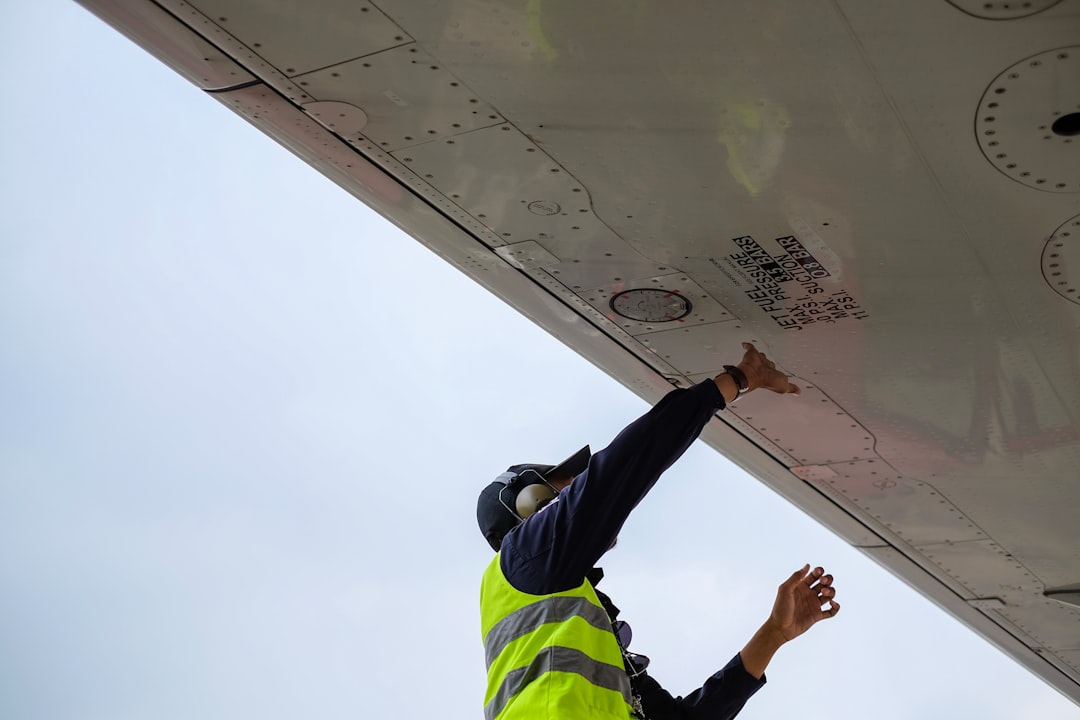The Benefits of Being a “Bird”: Why A&P-Licensed Field Service Technicians Love Their Jobs

In the aviation industry, the role of an A&P-Licensed Field Service Technician stands out as one of the most dynamic and rewarding careers. For those with a passion for flight and a knack for mechanics, this profession offers unique advantages that are hard to match in other fields. Whether you're an aspiring aircraft technician, an industry reporter, or a hiring manager, understanding the benefits of these positions can provide valuable insights into this vital segment of the aviation workforce.
The Life of an A&P-Licensed Field Service Technician
 by Andrew Neel (https://unsplash.com/@andrewtneel)
by Andrew Neel (https://unsplash.com/@andrewtneel)
An A&P (Airframe and Powerplant) license is the gold standard in the aviation maintenance industry. It represents a technician's authority to inspect, maintain, and repair aircraft. Field service technicians holding this certification are often on the move, responding to aircraft maintenance needs wherever they arise. This career is not just about technical proficiency; it's about a love for aviation and a commitment to safety and excellence.
A Day in the Life: Diverse Responsibilities
The daily responsibilities of an A&P-Licensed Field Service Technician are varied and dynamic. Technicians might begin their day with routine inspections, ensuring that every component of the aircraft meets safety standards. As the day progresses, they may address unexpected mechanical issues, requiring quick problem-solving skills. The role demands adaptability and a readiness to tackle diverse challenges that can arise at any moment.
Mastering Complex Systems
A key aspect of the job is mastering the complex systems that power modern aircraft. Technicians must have an in-depth understanding of avionics, hydraulics, and propulsion systems. This mastery allows them to diagnose issues accurately and implement effective solutions swiftly. Continuous learning is essential, as technological advancements in aviation require technicians to stay updated with the latest innovations and methodologies.
The Heart of Aviation Safety
A&P-Licensed Field Service Technicians are at the heart of aviation safety. Their work ensures that every flight operates without technical hitches, protecting both passengers and crew. This responsibility instills a profound sense of purpose and pride in their work. The aviation industry relies heavily on these professionals to maintain its impeccable safety record, highlighting the critical nature of their role.
The Allure of Travel
One of the most appealing aspects of being an A&P-Licensed Field Service Technician is the opportunity to travel. Technicians often find themselves working in diverse environments, from bustling international airports to remote airstrips. Traveling A&P mechanic jobs are in high demand as airlines and service providers seek skilled professionals who can provide quick and efficient solutions to mechanical issues, regardless of location.
Exploring New Horizons
Traveling for work allows technicians to explore new horizons. From the vibrant streets of Tokyo to the serene landscapes of the Swiss Alps, the job takes them to places they might never have visited otherwise. This exposure to diverse cultures and environments enriches their personal and professional lives, broadening their perspectives and enhancing their adaptability.
Building Global Networks
Working in different locations enables technicians to build a global network of industry contacts. Collaborating with international teams fosters cross-cultural communication skills and professional relationships that can be beneficial throughout their careers. These networks often lead to exciting opportunities and collaborations, further enhancing their career prospects.
The Adventure of the Unknown
For those with a sense of adventure, the unpredictability of travel is a significant draw. No two days are the same, and technicians must be ready to adapt to new challenges and environments. This constant change keeps the job exciting and engaging, as technicians never know what the next assignment might bring.
Competitive Earnings and Career Stability

The aviation industry recognizes the critical role that A&P-Licensed technicians play in maintaining safety and efficiency. As a result, these positions are often accompanied by competitive salaries and benefits. According to the Bureau of Labor Statistics, the median annual wage for aircraft and avionics mechanics and technicians was $66,440 in May 2020. Furthermore, the demand for skilled aviation technicians is expected to remain strong, providing career stability for those entering the field.
Attractive Compensation Packages
Competitive salaries are just the beginning; many positions come with attractive compensation packages that include benefits such as health insurance, retirement plans, and travel allowances. These packages are designed to attract and retain top talent, reflecting the high level of skill and responsibility required in the role.
Opportunities for Overtime
Field service technicians also benefit from overtime opportunities, especially during peak travel seasons or when urgent repairs are needed. This potential for additional earnings further enhances the attractiveness of this career path. Overtime work not only boosts income but also provides experience in high-pressure situations, enhancing technicians’ problem-solving skills.
Long-Term Career Prospects
The aviation industry’s steady growth ensures long-term career prospects for A&P-Licensed technicians. As air travel continues to expand globally, the demand for skilled maintenance professionals remains robust. This stability offers a secure career path, with opportunities for advancement and specialization, ensuring that technicians can build a lifelong career in aviation.
Professional Growth and Advancement
The aviation industry is continually evolving, with new technologies and practices emerging regularly. This dynamic environment provides ample opportunities for professional growth and advancement. A&P-Licensed technicians can advance their careers by specializing in areas such as avionics, becoming lead technicians, or moving into managerial roles.
Specialization and Expertise
Technicians have the option to specialize in particular areas of interest, such as avionics or engine maintenance. Specialization not only enhances their expertise but also increases their value to employers. By focusing on a niche area, technicians can position themselves as experts, opening doors to advanced roles and higher compensation.
Pursuing Further Certifications
Many technicians choose to pursue further certifications, such as Inspection Authorization (IA) or additional ratings, to enhance their skills and career prospects. These certifications demonstrate a commitment to excellence and continuous learning, making technicians more competitive in the job market. Employers often seek certified professionals for leadership roles, recognizing their dedication and expertise.
Leadership and Management Opportunities
With experience and additional training, technicians can move into leadership and management positions. These roles involve overseeing teams, managing maintenance schedules, and ensuring compliance with safety regulations. Leadership positions offer a chance to influence industry practices, contribute to strategic decisions, and mentor the next generation of technicians.
The Work Environment Challenges and Rewards
Working as an A&P-Licensed Field Service Technician is not without its challenges. The job requires a high level of precision and attention to detail, as even the smallest oversight can have significant consequences. Technicians must be prepared to work in various conditions, from outdoor ramps in extreme weather to hangars with limited space.
Navigating Challenging Conditions
Technicians often face challenging working conditions, whether it’s extreme weather, tight deadlines, or complex mechanical issues. These situations require resilience and problem-solving skills. The ability to remain calm and focused under pressure is crucial, ensuring that technicians can deliver high-quality work in demanding environments.
The Satisfaction of Problem Solving
Despite these challenges, many technicians find the work incredibly rewarding. The satisfaction of diagnosing and resolving complex mechanical issues, ensuring aircraft safety, and contributing to the aviation industry's success is a significant motivator for those in this profession. Each resolved issue is a testament to their skill and dedication, reinforcing their passion for the job.
Contributing to Industry Success
Every successful repair or maintenance task contributes to the overall success of the aviation industry. Technicians play a vital role in ensuring that flights operate smoothly and safely, maintaining the trust of passengers and stakeholders. This contribution to a larger mission provides a sense of purpose and fulfillment that is unique to the field.
The Importance of Teamwork

Field service technicians often work as part of a larger team, collaborating with other mechanics, engineers, and pilots to ensure aircraft are safe and operational. This teamwork fosters a strong sense of camaraderie and support among colleagues, creating a positive and collaborative work environment.
Collaborative Problem Solving
Teamwork is essential in aviation maintenance, where complex problems often require collaborative solutions. Technicians work closely with engineers and pilots to identify issues and implement effective solutions. This collaboration enhances problem-solving capabilities, as team members bring diverse perspectives and expertise to the table.
Building Strong Professional Relationships
Working in teams helps build strong professional relationships that are vital for career growth. These relationships provide support and mentorship, enhancing technicians’ skills and confidence. A positive team environment fosters open communication and mutual respect, contributing to a fulfilling work experience.
Celebrating Shared Successes
Achieving maintenance goals as a team creates a shared sense of accomplishment. Celebrating these successes strengthens bonds among team members, reinforcing their commitment to excellence. This camaraderie contributes to job satisfaction and motivates technicians to continue delivering high-quality work.
Balancing Work and Life
While the life of a traveling A&P mechanic can be demanding, many technicians find ways to balance work and personal life. The flexibility of the job allows for periods of intense work followed by downtime, which can be used to recharge and spend time with family and friends. This balance is essential for maintaining long-term job satisfaction and well-being.
Flexible Work Schedules
The nature of field service work often allows for flexible scheduling, enabling technicians to balance professional and personal commitments. This flexibility is particularly beneficial for those with families, allowing them to be present for important events and spend quality time with loved ones.
Prioritizing Personal Well-being
Technicians recognize the importance of prioritizing their personal well-being to maintain job satisfaction. Engaging in hobbies, exercise, and relaxation during downtime helps them recharge and return to work with renewed energy. This focus on well-being is crucial for sustaining long-term performance and preventing burnout.
Finding Joy in the Journey
The unique lifestyle of a traveling technician offers opportunities to find joy in the journey. Exploring new places and meeting diverse people enriches their life experience, providing a sense of adventure and fulfillment. Embracing the journey, rather than just the destination, adds a layer of satisfaction to their career.
Conclusion A Career with Wings
For those with a passion for aviation and a desire to work in a dynamic, rewarding field, a career as an A&P-Licensed Field Service Technician offers numerous benefits. From the opportunity to travel and competitive earnings to professional growth and a supportive work environment, this profession provides a fulfilling career path for those who are up to the challenge.
Embracing Opportunities for Growth
Whether you're just starting out or looking to advance your career in the aviation industry, the role of a field service technician is a path worth considering. Embrace the chance to be a part of a vital industry, where your skills and dedication can make a significant impact every day. The opportunities for growth, both personally and professionally, are vast and rewarding.
Making a Meaningful Impact
Technicians play a crucial role in ensuring the safety and reliability of air travel, making a meaningful impact on the industry and society. Their work contributes to the smooth operation of global transportation networks, facilitating connections between people and cultures. This impact is a source of pride and motivation for those in the field.
A Future with Endless Possibilities
The future for A&P-Licensed Field Service Technicians is filled with endless possibilities. As the aviation industry continues to evolve, technicians will have the opportunity to shape its future, embracing new technologies and innovations. This dynamic and ever-changing landscape offers a promising and exciting career path for those with a passion for flight and a commitment to excellence.
